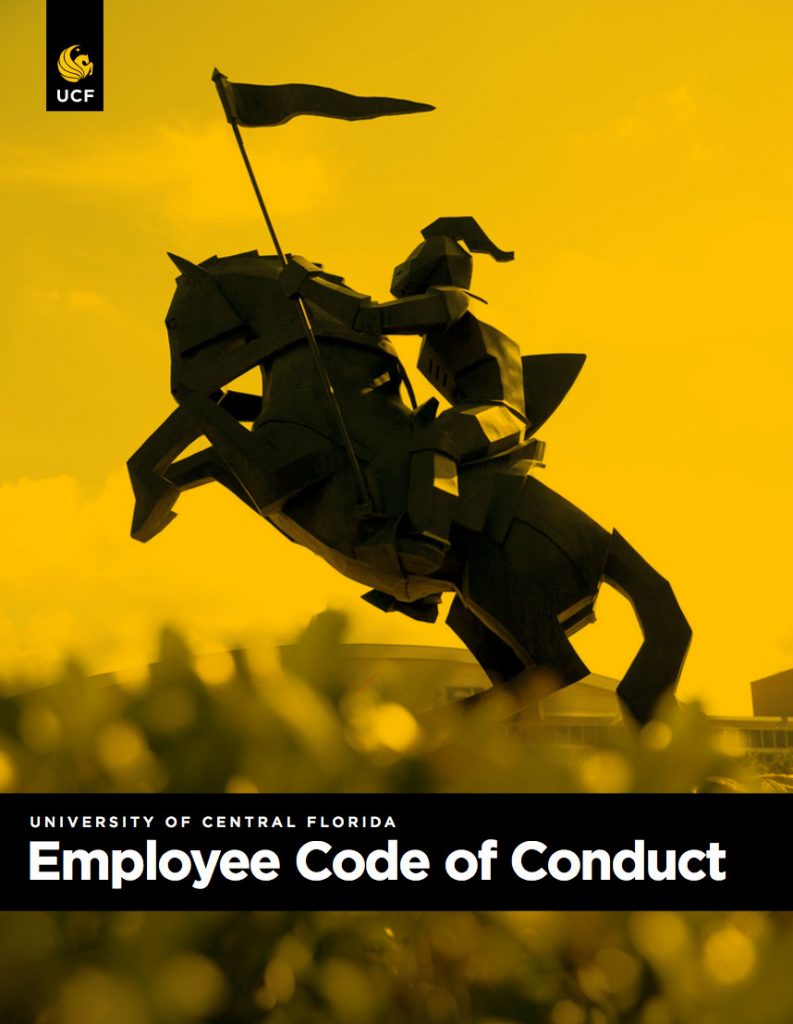 UCF Compliance & Ethics Newsletter
UCF Compliance & Ethics Newsletter
FAQs
In each IntegrityStar edition, we highlight some frequently asked questions. In this seventh edition, we offer the following information with questions and answers taken directly from the Let’s Be Clear website.
LET’S BE CLEAR…
RESPONSIBLE EMPLOYEES AT UCF HAVE A DUTY TO REPORT
At UCF THERE ARE TWO TYPES OF EMPLOYEES… CONFIDENTIAL EMPLOYEES AND RESPONSIBLE EMPLOYEES.
A Confidential Employee is any UCF employee or DSO who is entitled under state law to have privileged communications. Confidential employees will not disclose information about prohibited conduct to the university without the permission of the student or employee.
Confidential employees and resources at the University of Central Florida include the following:
- Health Services employees
- Counseling and Mental Health Services employees
- Employee Assistance Program employees
- Ombuds Office employees
- Victim Services employees
- Student Legal Services employees
- Volunteer chaplains
A Responsible Employee is any employee and DSO who is not a confidential employee.
Responsible employees include (but are not necessarily limited to):
- Faculty (full-time and part-time)
- Staff (full-time and part-time)
- Resident Assistants
- Graduate Students with classroom responsibilities
- All those employees identified as Campus Security Authorities (CSAs).
Duties of Responsible Employees
In no event should the victim be told that your conversation will be confidential.
As a UCF employee, you have an obligation under the Prohibition of Discrimination, Harassment, and Related Interpersonal Violence to advise the Office of Institutional Equity if you witness or receive a report of a sexual assault.
As a faculty or staff member who sees your students regularly, you are in a unique position to detect behavioral changes, increased stress levels, or academic deterioration that can signal a serious problem. Students value faculty and staff opinions. You are not expected to take on the role of counselor or investigator, but don’t underestimate your ability to share helpful information with your students about the resources available at UCF, especially if a student approaches you for help.
Frequently Asked Questions
WHAT KIND OF REPORT SHOULD I FILE?
While survivors are strongly encouraged to make a report to both the police and the Office of Institutional Equity (OIE) for assistance and investigation, it is ultimately the survivor’s decision as to which type(s) of report, if any, are best for their recovery and well-being. The police investigate criminal violations. The University (OIE) investigates University conduct code and policy violations. Reporting can help to ensure the safety of the victim-survivor and the entire campus community. The Advocates at UCF Victim Services can assist you in deciding what type of reporting is best for you.
DOES IT MATTER WHEN I REPORT THE SEXUAL ASSAULT?
You can always report a sexual assault to the police and/or University regardless of when it occurred. However, it may be helpful for you to know that the sooner you file a report after the incident, the better the chances that helpful evidence can be collected to support a criminal case, that you will be able to convey a clear account of what happened, and that the police and University will be able to identify and speak with witnesses. If you wish to report the assault to the police, it is strongly recommended that you do so as soon as possible after the assault. Also, if you choose to report the incident to the University and utilize the student conduct process (either in addition to or in lieu of the criminal prosecution process), there is no time limit to initiate the case.
WHAT ARE THE BENEFITS OF REPORTING THE SEXUAL ASSAULT TO THE POLICE?
The benefits of reporting the assault to the police are that the police can preserve evidence of the assault; the police can advise a victim on safety planning techniques, including how to obtain a restraining order and/or protective order; the police can escort a victim to obtain the necessary medical treatment; the police can inform the victim of his/her eligibility for state crime victim compensation funds (compensation for medical and dental expenses related to the crime; counseling, lost wages, and other assistance); and the police will assist with prosecuting the accused, which can lead to punishment of the accused and protection of the victim and others in the community from being victimized.
WHAT IF I DON’T WANT TO FILE A CRIMINAL REPORT?
You are not required to file a criminal report. The decision whether to report the assault to the police is entirely your decision to make. If you choose not to report the assault to the police, you are still encouraged to obtain medical treatment and contact an advocate to assist you with recovering from this event.


